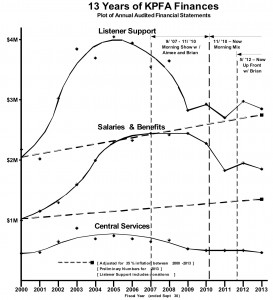We Can All Save KPFA Together

Local KPFA Station Board Member, Akio TanakaWe Can All Save KPFA Together
by Akio Tanaka
8-22-11 The crisis that KPFA faced in the fall of 2010 was insolvency.
Between 2001 and 2006, there was a dramatic increase in listener support due to the expanding economy and interest in the Iraq-Afghan War. KPFA added many paid staff during this same period; however, between 2007 and 2010 listener support declined dramatically as the whole economy crashed.
Payments to Pacifica were reduced to reflect the decline in listener support and Pacifica had major layoffs, but KPFA management did not make similar cuts to salaries and benefits even as listener support declined between 2007 and 2010. It is understandable that the previous management would be reluctant to lay people off, but in 2008 the station went into deficit spending and was in danger of bankruptcy. So, finally the Pacifica Foundation, which is fiscally responsible for the network of five stations, stepped in and made cuts in staffing.

Instead of acknowledging that Pacifica had carried out the thankless but necessary task of cutting expenses, some of the paid staff affiliated with the Communication Workers of America (CWA) claimed that layoffs were not necessary and that there had been union busting on the part of Pacifica. They alarmed many paid staff by claiming there was a political hit list of people to be laid off. The ‘hit list’ was the union seniority list.
What Pacifica actually did was to offer voluntary severance to all employees. Seven people took the deal, and in the end, two people were laid off, Aimee Allison and Brian Edwards-Tiekert. Edwards-Tiekert had the option to exercise his seniority bumping rights.
The layoffs followed the union contract which says: “In cases where skill, ability, knowledge and job performance are all equal, or could be equal in the opinion of the Employer after reasonable orientation and training, seniority shall prevail”, but CWA claimed the layoffs violated the terms of the union contract and filed three grievances with the National Labor Relations Board (NLRB) and asked for an arbiter to rule on reinstating Edwards-Tiekert and Allison to the Morning Show. These claims led many labor supporters to voice solidarity with the CWA.
Over the next several months, two anonymous websites, SaveKPFA and KPFAworker, waged a campaign to vilify Pacifica Executive Director, Arlene Engelhardt.
In February, Edwards-Tiekert exercised his bumping rights and returned as a P/T news reporter. In April, the NLRB issued an advice memo dismissing one of the three CWA grievances and CWA then withdrew the two remaining grievances. In July, the arbiter ruled against Allison’s reinstatement.
Pacifica was vindicated on all counts associated with or having to do with labor issues.
KPFA has a solid line-up of Al-Jazeera English at 6am, Democracy Now! at the prime commute time of 7am, and Morning Mix at 8am, hosted by both volunteers and staff who stepped up to help the station during these financially difficult times.

Adrienne Lauby – Live from the Progressive Festival, Fall 2011
Most importantly, the station is on the road back to financial stability.
However, the people who tried to vilify Arlene Engelhardt are now trying to recall Tracy Rosenberg from the local station board.
Rosenberg saw that KPFA was on a path to a fiscal train wreck and carried out her fiduciary duty as a member of the National Finance Committee in trying to save both KPFA and Pacifica from financial ruin. She also tried to help publicize the new Morning Mix show. Both actions served the interest of KPFA and the Foundation.
It is understandable that with the political division KPFA has experienced over the past several years that any layoff produces controversy, but we should all remember that the ideals and goals we share are far stronger than our differences. And the people need KPFA and Pacifica more than ever before.
Arlene Engelhardt and Tracy Rosenberg both helped save KPFA.
We can all save KPFA together by each of us making a generous donation and working together. Make a donation. Become a new member.
 Gray Panthers of San Francisco
Gray Panthers of San Francisco







